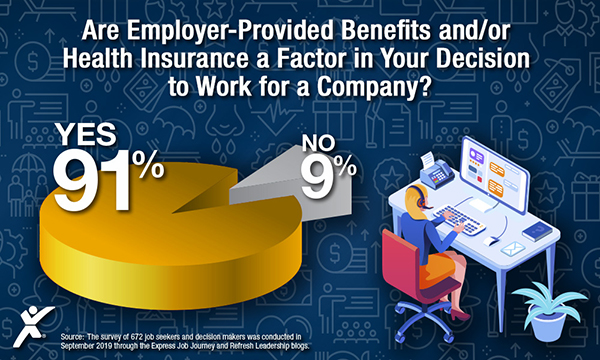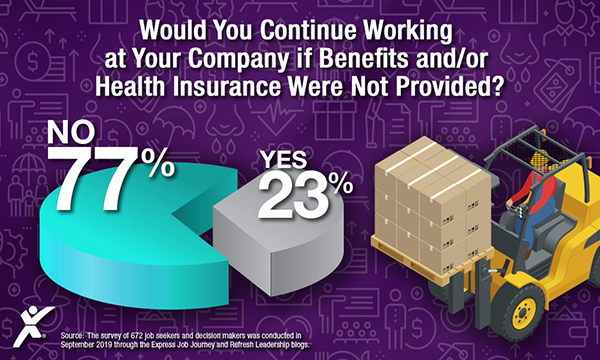Why a Job without Health Insurance Terrifies Many
OKLAHOMA CITY - October 23, 2019

Why a Job without Health Insurance Terrifies Many
91% of Job Seekers Say Benefits Are a "Deciding Factor" in Job Offers
Vast Majority Would Leave Job if They Lost Employee Benefits/Insurance
Experts: In This Market, Job Seekers Can Afford to Be Selective
When job seekers evaluate job offers and opportunities, they look at more than just the hourly wage or base salary. According to a new survey from Express Employment Professionals, the vast majority-91%-consider health insurance and other benefits a "deciding factor."
Express surveyed 672 job seekers and posed the question, "Are employer-provided benefits and/or health insurance a deciding factor in your decision to work for a company?"
- Ninety-one percent said, "Yes, it is a deciding factor."
- Nine percent said, "No, it is not a deciding factor.
Express also asked about the effect of losing such benefits. Respondents were asked, "Would you continue working at your company if benefits and/or health insurance were not provided?"
- Seventy-seven percent said "no."
- Twenty-three percent said "yes."
Current federal law
requires
companies with more than 50 full-time employees to offer health insurance to those employees, though some health care reform proposals and litigation in recent years have sought to end or invalidate that requirement. Other proposals have sought to supplant employer-based insurance with government-provided coverage.
Express franchise owners emphasize that in the current market, job seekers can afford to be picky about benefits.
"It's still a job candidate's market, and savvy businesses realize that they will need to offer a strong benefits package to attract and retain top talent," said Terri Greeno, an Express franchise owner in Crystal Lake, Illinois.
Still, entry-level employees are less likely to consider health insurance a deciding factor.
"Professional candidates are usually much more interested in benefits than the average worker and not just healthcare," Greeno added. "They're interested in paid time off, 401(k) plans, flexible work environments and a wide variety of other benefits."
David Robb, director of marketing at the Express franchise in Grand Rapids, Michigan, agrees.
"The importance of benefits really depends on the level of the position and candidate," he said. "For many industrial positions, the candidates are mostly focused on the pay rate-a $0.50 pay bump is more important to them than benefits. Typically, non-management candidates in the industrial sector are more concerned about the amount of money being taken out of their check for benefits than they are about the type of benefits."
The rising cost of health insurance does put pressure on employers, and more of those costs could be passed on to employees if the trend continues.
"As the cost of health care continues to climb, I would expect companies would try to pass on more of that cost to their employees, or perhaps provide coverage that might not be as robust," Greeno explained.
Yvonne Rockwell, an Express franchise owner in Santa Clarita, California, says that employer-provided health insurance is becoming a "must-have" for employers to attract top talent. But she says she can see with the escalation in health care costs that employee contributions will need to rise to offset the increases.
Health care is not the only benefit that's becoming a must-have, said West Omaha, Nebraska, Express franchise owner Bernie Inbody. Employees are also relying on "tuition reimbursement to help with upskilling or reskilling."
Employer-provided health insurance takes on an even greater importance-and can be a source of anxiety-when the employee is providing it for the whole family.
"Carrying the health benefits for the family is incredibly scary, and a job candidate would likely pass on an offer that doesn't include a comprehensive package," Greeno said.


Employer-provided health care is a critical factor in the job search, agrees Bill Stoller, CEO of Express.
"For workers with families, the fear of not having health care is real," he said. "In such a tight labor market, very few workers are willing to leave their health care up to chance. And as long as we continue seeing a tight labor market, the level of benefits that employees expect-and can demand-will continue to rise."
The survey of 672 job seekers and decision makers was conducted in September 2019 through the Express Job Journey and Refresh Leadership blogs.
###
If you would like to arrange for an interview with Bill Stoller to discuss this topic, please contact Sheena Karami, Director of Corporate Communications and PR, at (405) 717-5966.
About Bill Stoller
William H. "Bill" Stoller is chairman and chief executive officer of Express Employment Professionals. Headquartered in Oklahoma City, the international staffing company has more than 800 franchises in the U.S., Canada and South Africa. Since its inception, Express has put more than 7.7 million people to work worldwide.
About Express Employment Professionals
Express Employment Professionals puts people to work. It generated $3.56 billion in sales and employed a record 566,000 people in 2018. Its long-term goal is to put a million people to work annually. For more information, visit
ExpressPros.com.